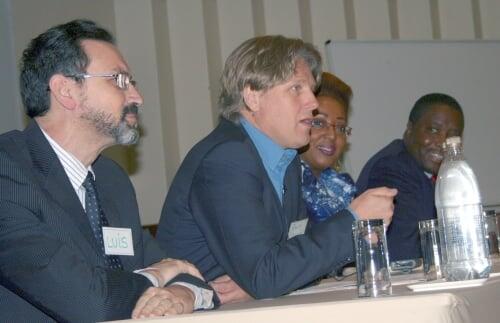Gender equality and women’s empowerment have for a long time been seen as women's issues, and it is women who have primarily been at the forefront of advancing the gender agenda. Equality is not a women's issue, however, but a human rights issue.
These remarks were made by Edwin Huizing, UNFPA Director for the Sub-Regional Office in Johannesburg at a five-day capacity-building workshop entitled ‘Gender Transformative Norms and Regional Consultation Meeting’ organised by UNFPA, the United Nations Population Fund and Sonke Gender Justice Network in Johannesburg this week. The first three days of the workshop tackled the issues of gender and reproductive health while the last two days were devoted to the UNAIDS Agenda.
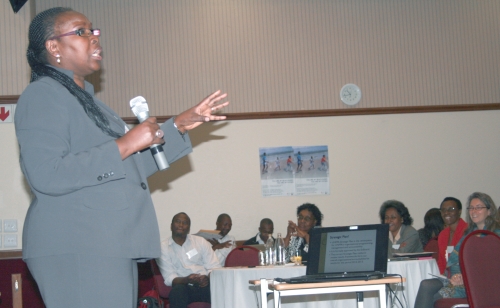
Mr. Huizing said a variety of factors contribute to women and girls vulnerability to GBV and HIV. “They include social norms, which deny women sexual health knowledge and practices that prevent them from controlling their bodies or deciding the terms of their sexual reproductive health and rights.”
“While culture is a key determinant of gender power relationships, it is patriarchal structures and systems that are the vehicles through which gender inequalities, discrimination and the subordination of women are perpetuated and justified; and from which men reap unfair benefits and dominate women,” he said.
“Men and boys comprise half the population and, what is more, still maintain unequal positions of social, economic and political power. Then surely men must be mobilized if we are going to achieve our goals of equality and equity, including an end to all forms of violence against women.”
Working with men and boys to promote equality
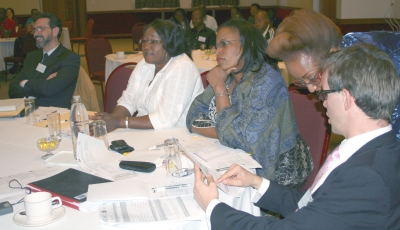
More than 70 participants from 15 countries in East and Southern Africa and from the U.S.A. participated in the meeting on work to engage men and boys in HIV, GBV and maternal mortality prevention, and the promotion of gender equality and sexual and reproductive health in Sub-Saharan Africa. Participants included UNFPA ESA Gender and Reproductive Health National Programme Officers, and MenEngage Africa partners, in collaboration with Sonke Gender Justice Network and Promundo.
The meeting sought to build the capacity and understanding of participants on the gender transformative norms approach, and provide an opportunity to review and strengthen work to date within the region on engaging men and boys. The objective was to increase the scale, impact and sustainability of the work in engaging men and boys to promote gender equality, prevent and address gender-based violence, promote reproductive health and rights, and reduce the spread and impact of HIV and AIDS across Africa.
“Challenge men to change”
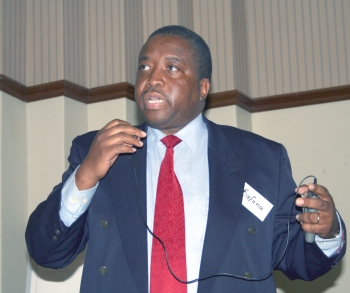
Reverend Bafana Khumalo, the co-founder of Sonke, said in his opening remarks that men are imprisoned by patriarchy and an assumption that it is unAfrican for men to be caring, nurturing and affectionate. “The consequences of men having to be go-getters and achievers is alcohol abuse, unprotected sex and violence. The task for us and for society is to challenge men to change,” he said.
“Norms define how we behave towards each other. If we are to challenge the norms, we need to start at the root where the problem is. We have to engage men and boys in order to break the cycle of gender violence. If you do not engage men, you are not going to break the cycle.”
Participants shared their country experiences in working to change gender norms around HIV, sexual and reproductive health, and gender-based violence. They looked at how to develop a gender transformative programme, and at examples of programmatic interventions and techniques, including targeted and mainstreamed processes. They discussed the development of a country-level action plan to integrate gender-transformative norms in existing programmes. The workshop also addressed the future priorities in work in Africa.
Accelerating action on gender equality and HIV
The second leg of the workshop from 4-5 October was a meeting on the UNAIDS agenda for accelerated action for women, girls, gender equality and HIV. Two recommendations were considered, the first being to jointly generate better evidence and increased understanding of the needs of women and girls in the context of HIV, and ensure prioritized and tailored national AIDS responses that protect and promote the rights of women and girls.
The second recommendation was to champion leadership for an enabling environment that promotes and protects the human rights of women and girls and their empowerment, in the context of HIV, through increased advocacy and capacity, and adequate resources.
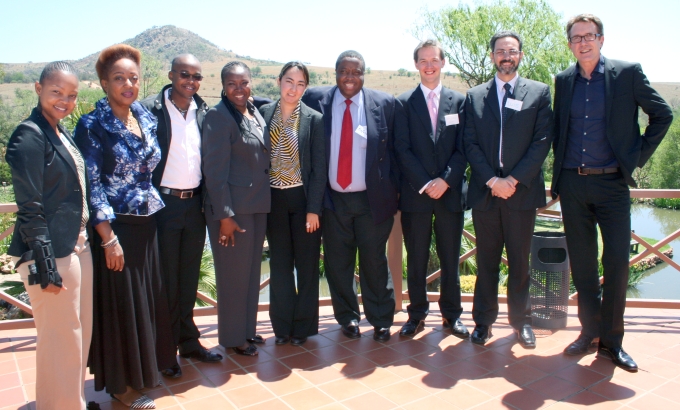
Itumeleng Komanyane, Sonke Gender Justice, Nafissatou Diop, UNFPA Gender HR & Culture Branch Technical Adviser, Nkonzo Khanyil, Sonke Gender Justice, Seynabou Tall, UNFPA Technical Adviser for Gender in the Sub-Regional Office in Johannesburg, Leyla Sharafi, UNFPA Gender HR & Culture Branch Technical Technical Specialist, Rev. Bafana Khumalo, Sonke Gender Justice Network co-founder, Tim Shand, Sonke International Programmes Co-ordinator, Luis Mora, UNFPA Chief of Gender HR and Culture Branch, and Dean Peacock, Sonke Executive Director and co-founder.

